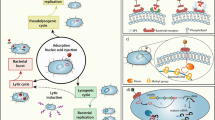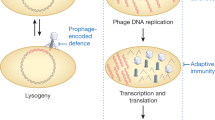Abstract.
Bacteriophages (phages) are omnipresent in our environment, and recent studies highlight their potential impact on the microbial world. Phages can also be present in mammalian organisms, including man (intestines, oral cavity, urine, sputum and serum). Data are available which suggest that those endogenous phages could play an important role in eliminating bacteria and regulating the body ecosystem. Furthermore, our most recent findings suggest that phages can exert immunosuppressive action in the gut, helping control local inflammatory and autoimmune reactions, and demonstrate anticancer activity. We hypothesize that phages could act in concert with the immune system in immunosurveillance against bacteria, viruses and cancer.
Similar content being viewed by others
Author information
Authors and Affiliations
Corresponding author
Additional information
article dedicated to Professor Ludwik Hirszfeld to commemorate the 50th anniversary of his death
Received 8 September 2004; received after revision 18 October 2004; accepted 21 October 2004
Rights and permissions
About this article
Cite this article
Górski, A., Weber-Dabrowska, B. The potential role of endogenous bacteriophages in controlling invading pathogens. CMLS, Cell. Mol. Life Sci. 62, 511–519 (2005). https://doi.org/10.1007/s00018-004-4403-6
Issue Date:
DOI: https://doi.org/10.1007/s00018-004-4403-6




